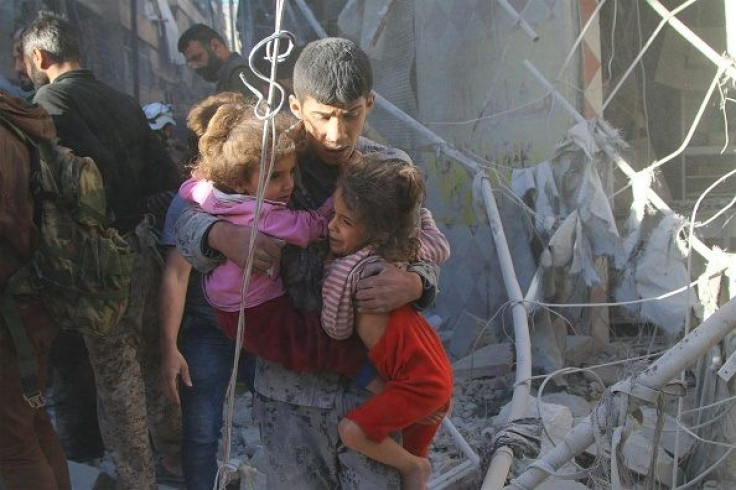Intensified Russian Airstrikes In Syria With Regime On The Offensive

The Syrian army and forces fighting alongside the Syrian regime on Wednesday launched offensives in several of Syria’s most strategic regions. At least six of the country’s 14 governorates saw clashes and heavy airstrikes from pro-regime forces on Wednesday.
Pro-regime offensives against Syrian opposition have been escalating and expanding over the last two weeks. The new operations mark a significant change in the Syrian dynamic on the ground as pro-regime forces backed by Russian airstrikes and Iran-backed militias attempt to seize territory long-held by Syrian opposition groups instead of focusing on repelling their advances.
The offensives including both Russian airstrikes and Iran-backed militias on Wednesday come after rumors circulating that there is a rift between Russia and Iran in Syria, and even a report that Iran may be pulling out of Syria.
“We are everywhere in Syria now. Homs, Aleppo, Lattakia. We are using very special tactics because there is not a lot of us on the ground,” a commander from the Iran-backed Lebanese Shiite group Hezbollah told International Business Times.
The provinces of Latakia, Hama, Idlib, Dara and Deir Ezzor all saw pro-regime clashes and Russian airstrikes, but on Wednesday the major offensive focused on eastern and southern Aleppo, a northwestern Syrian province that has been the sight of fighting from all sides since the early years of the Syrian conflict.
Haraket Al-Nujba firing artillery in south #Aleppo #Syria pic.twitter.com/u8maGppAPo
— Hassan Ridha (@sayed_ridha) December 16, 2015Aleppo is Syria’s largest city and home to a main highway that connects supply routes from the country's eastern provinces to the western governorates. Russian and Syrian airstrikes hit three cities in southern Aleppo on Wednesday, a sign that the pro-regime forces have renewed an offensive from last month to seize the strategic M5 highway. Whoever controls the highway benefits from these strategic supply routes linking Aleppo to the rest of the country to bring in military reinforcements, access humanitarian aid and widen their trade routes.
Also on Wednesday, Hezbollah launched an offensive in Zerbeh, a town the southwestern outskirts of Aleppo city, backed by Russian airstrikes.
Hezbollah’s operation in Zerbeh came after a report from the Syrian Observatory for Human Rights on Monday that Syrian rebels and Jabhat al-Nusra forces had killed 14 of the Lebanese Shiite fighters in Aleppo.
“So the losses were seeing, we don’t consider them as big of a loss compared to the achievements we’ve had. It’s not our land,” the Hezbollah commander said.
The opposition side of the southern battle arena in Aleppo is a melting pot of terrorist and rebel groups, including Harakat Nour al-Din al-Zenki -- one of the first rebel groups to be part of the U.S. train-and-equip program -- the First Regiment of the Free Syrian Army, the Sultan Murad Brigade, a Turkmen brigade and al-Qaida’s Jabhat al-Nusra.
While the new offensives appear to be targeting opposition-controlled areas, a number of civilians have been caught in the crossfire. The Syrian Observatory for Human Rights documented the death of 353 civilians, including 94 children and 60 women, since the uptick in Russian and Syrian regime airstrikes began on Dec. 1. At least a thousand others have also been injured.

The new wave of operations comes less than a week after a three-day meeting in Saudi Arabia where Syrian opposition groups signed an agreement to take part in negotiations with Syrian President Bashar Assad next year in the hopes of creating “democratic mechanism through a pluralistic regime that represents all sectors of the Syrian people”.
“We want to achieve the aims of the revolution,” Capt. Islam Alloush, a spokesperson for the Jaish al-Islam rebel group, one of the signatories to the agreement, told IBT. “In the Riyadh conference, we emphasized that the cessation of bombardment, forced displacement, return of refugees and lift of siege are the conditions for the political process.”
But some opposition groups are reluctant to believe that the Syrian regime is taking negotiations seriously, as the military responded to the agreement with a series of deadly bombings on opposition-held areas. On Sunday, the Syrian army launched a series of airstrikes on the rebel-held city of Douma, killing at least 45 civilians.
“The massacre [in Douma] stresses that the regime absolutely refuses the political solution and this was highly expected,” Alloush said.
© Copyright IBTimes 2024. All rights reserved.












